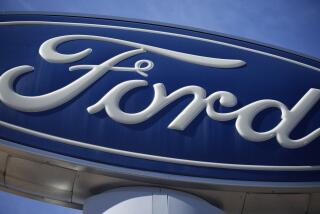Ford Plans to Increase Its Hybrid Production Tenfold
- Share via
Ford Motor Co., the second-largest U.S. automaker, plans a tenfold increase in vehicles powered by gasoline-electric hybrid engines as it attempts to catch up with Toyota Motor Corp. in building products that are friendly to the environment.
More than half the company’s Ford, Lincoln and Mercury models will have hybrid versions by the end of the decade, Chief Executive William Clay Ford Jr. said in an address to employees Wednesday. This would bring the company’s annual hybrid output to 250,000. The company’s hybrids will be profitable by 2010, he said after the presentation. Ford billed himself as an environmentalist when he took over as the company’s chairman in 1999.
At least one critic welcomed the announcement.
“Ford is at the bottom of the barrel among major automakers on fuel economy, but today is a better day,” said Dan Becker, Washington director of the Sierra Club’s Global Warming Program in Washington. “Increasing hybrid production is a good step in the right direction.”
Becker had criticized Ford’s 2003 disclosure that the company wouldn’t deliver on a promise to boost sport utility vehicle fuel economy by 25%.
Hybrids are more efficient than conventional vehicles because they run in part on electric motors powered by a battery pack that recharges during braking. Hybrid vehicles now account for 1% of the U.S. auto market. Automakers, led by Toyota, are boosting hybrid production as prices for gasoline in the U.S. have tripled over the last seven years.
Last year, Ford became the first U.S. automaker to offer a hybrid SUV, a gasoline-electric version of its Escape. The company also is introducing a Mercury Mariner SUV with a hybrid engine. The 2006 hybrid Mariner sells at a starting price of $29,840. The standard gasoline-powered Mariner sells for $21,995 to $27,400, according to Edmunds.com, an automobile price website.
“On hybrids, it’s a question of whether there’s significant demand for a product that’s significantly more expensive,” said David Cole, chairman of the Center for Automotive Research in Ann Arbor, Mich.
Gasoline-powered engines can boost fuel efficiency by 20% to 25% with an additional cost of $1,000, Cole said. Diesel-powered engines, at an extra cost of $3,000, can deliver a 30% increase but may be unable to meet federal and state government limits on nitrous oxide emissions. Hybrids can deliver a 30% increase in fuel efficiency with an additional cost of as much as $6,000, he said.
Ford shares closed Wednesday at $9.66, down 10 cents.
More to Read
Inside the business of entertainment
The Wide Shot brings you news, analysis and insights on everything from streaming wars to production — and what it all means for the future.
You may occasionally receive promotional content from the Los Angeles Times.










